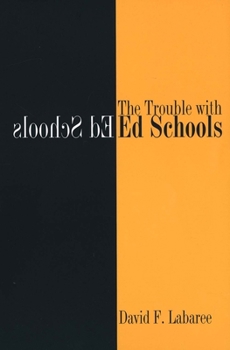The Trouble with Ed Schools
Select Format
Select Condition 
Book Overview
American schools of education get little respect. They are portrayed as intellectual wastelands, as impractical and irrelevant, as the root cause of bad teaching and inadequate learning. In this book... This description may be from another edition of this product.
Format:Paperback
Language:English
ISBN:030011978X
ISBN13:9780300119787
Release Date:September 2006
Publisher:Yale University Press
Length:256 Pages
Weight:0.75 lbs.
Dimensions:0.6" x 6.1" x 9.3"
Customer Reviews
2 ratings
Poor, Poor Education Schools!
Published by Thriftbooks.com User , 15 years ago
As a graduate student in special education, I can attest that ed schools seem to lack the rigor and respectability of other collegiate departments. The research is very "soft," the curricula are very "fad heavy" and the classes are less than rigorous (to put it nicely). David Labaree takes this as his starting point. The first chapter argues THAT these things are true, and from there, he undertakes a multi-layered explanation of WHY they are true. To my eyes, his arguments are spot on, sensical, and very thorough. The strongest argument for the low status of ed schools (and their lack of intellectual rigor) is the idea that ed schools straddle a delicate balance between wanthing (a) to maintain a monopoly on ability to certify new teachers, and (b) the ability to fill an ever largening demand to crank out new teachers. The former demands rigor (or at least public perception of it), while the latter demands that the curriculum is "easy" enough that ed schools can crank out teachers at a fast rate. Labaree also writes about other factors influencing the low status of the education school. Education is an irreducibly practical, rather than theoretical, discipline and, as such, training teachers has the status of training nurses (rather than lawyers or scientists). Add to this the fact that as all of us have been educated for at least 12 years, education is the only profession that everyone has face-to-face contact with for an extended time (and hence, it is not a mysterious field like medicine or accounting, that operate "behind closed doors.") To me, the most interesting chapter was that discussing education schools infatuation with "progressive pedagogy" a la John Dewey. Any current graduate student can attest that this is the case, but Labaree's spin is intersting. One thing, he suggests, that makes ed schools romance with progressive educaiton so strange is that progressive pedagogy has had little bearing on how schools actually work. (Their influence, he writes, has been more rhetorical than actual.) Thus, ed professors are often viewed as out-of-touch and "blinded by progressivism" that has been largely impotent in how schools actually work. As a minor, minor criticism, one idea I wish he would have discussed was the absurdity that most education professors teach future teachers while not themselves being in the k-12 classroom. This is particularly a problem at the graduate level, where most of my fellow students are "conditionally certified" teachers being taught how to teach by those who aren't in public school classrooms. It is a bit like non-doctors teaching doctors how to practice medicine (they can teach the thoery, but are rusty on teaching the practice because they are non-practitioners.) I enjoyed reading this book immensely. Labaree takes a very neutral and analytical tone throughout, keeping neutral on whether education schools deserve their low status. He is not interested in arguing either way, but only outlining a theor
Wonderfully written, convincingly argued
Published by Thriftbooks.com User , 17 years ago
Full disclosure: I know the author personally through taking a course with him. That said, I purchased this book on a whim and ended up spending several days of a vacation reading it with the same excitement as I would a good novel. The writing is fantastic and the arguments provocative. Many education researchers live with a sense that our work is not taken quite seriously as other fields in the academy (such as physics or medicine). Comparing schools of education to other professional schools in law and medicine, Labaree presents a convincing essay on the origins and reasons for the low status of the education school. The chapter on the romance with progressivism was especially interesting to me. As previously stated, the quality of writing is as good as it gets, with arguments likely to make you think and a nice balance between progressive and conservative thinkers.






